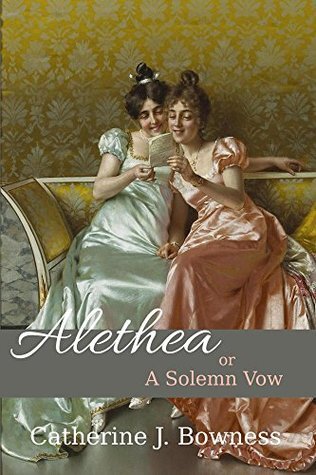Review: Alethea by Catherine J Bowness (2014)
 Catherine J Bowness is a new author to me, but I’ll certainly be reading more of her work. This was delightful. It’s very traditional, so anyone hankering for something in the style of Heyer, complete with presentations and vouchers for Almack’s and rides in Hyde Park, should find this hits the spot. There are shades of Arabella, and also Venetia, although it’s also very much itself, not a pale imitation.
Catherine J Bowness is a new author to me, but I’ll certainly be reading more of her work. This was delightful. It’s very traditional, so anyone hankering for something in the style of Heyer, complete with presentations and vouchers for Almack’s and rides in Hyde Park, should find this hits the spot. There are shades of Arabella, and also Venetia, although it’s also very much itself, not a pale imitation.Here’s the premise: Alethea Benstead is seventeen, the oldest of a whole string of daughters to a country gentleman of reduced means and his jaded wife. Alethea is the beauty of the family, so it falls to her to marry well and restore the family’s fortunes. The only trouble is that she doesn’t want to marry at all, and with the dispiriting example of her parents in front of her, who can blame her? But her aunt and uncle have invited her to London for a spectacular come out, and no one takes her objections seriously. One day she’s out for a long walk to escape the thoughts of her unwanted future, when she gets lost (on her family’s land? Where she’s been walking all her life? Really?) and finds herself on the public highway. So she flags down a passing farmer and hitches a lift home…
Wait, what? No, of course not! This is a Regency romance, so along comes a handsome young man, an earl, no less, with the hard-to-pronounce name of Lord Knill, who nearly runs her down, berates her angrily, is berated in his turn and then kisses her. Because of course he does. That just makes her really mad, but he seems to be the only way for her to get home, passing farmers being in short supply, so he drives her home, and she hopes she’ll never see him again. Or so she says.
Her companion on the journey to London is a distant cousin, Eleanor Peabody, who is thirty-one, newly orphaned and penniless, with no relations interested in helping her, so she’s travelling to London to find a position as a governess. Eleanor is (to my mind) a far more interesting character. She’s far more placid and sensible, an interesting foil to Alethea’s volatile temperament. On the journey, they have a couple of encounters, first with Ivo, son of the aunt in London, and then, after their carriage overturns (this is a *very* traditional Regency), they are rescued by Lord Knill, who coincidentally happens to be passing. Because of course he does. And then they are held up by a highwayman who is seen off by Lord Knill, and they haven’t even reached London yet.
The aunt, Lady Algernon Ferris, conveniently is delighted to have two pretty girls to bring out, so Eleanor is told to forget about governessing and enjoy the season. They are rigged out in fine style, and the beautiful Alethea becomes an instant success. This all happens very easily, and even the all-important vouchers for Almacks miraculously appear. In fact, the world of the ton seems to be a very benign place, where almost everyone is friendly, a duke attracts virtually no comment and even a gallop in Hyde Park passes unremarked. Of course, there has to be a villain, but it’s a long time before things become sticky.
The two heroes for Eleanor and Alethea are not exactly the obvious ones. In my opinion, the volatile and immature Alethea would have been better suited with the equally immature Ivo (when they both grow up), and I’d have liked Eleanor to have the charming and dashing Lord Knill, but the author had other ideas. In fact, the state of play between Alethea and Lord Knill quickly becomes very intense, and their passionate exchanges are an absolute highlight of the book for me. Regency manners impose so much restraint that to see them both losing their composure in such spectacular fashion is awesome. This is particularly true of Lord Knill, because while Regency heroines often dissolve into quivering wrecks, heroes tend to be suavely controlled, and I loved him for being so openly distraught. Eleanor and her suitor have a much more sedate courtship, so much so that she completely misunderstands his intentions. Fortunately, they’re both sensible people and very quickly sort out the difficulty.
I did warn you that this is a *very* traditional Regency, so there’s the inevitable descent into implausible melodrama at the end, which is spectacularly over the top. I loved that when the crisis comes, the two heroines respond precisely in character. Alethea rushes off to effect a rescue herself, with the reluctant Ivo in tow, while Eleanor quietly summons help. This was perfect.
However, there is a huge faux pas buried in the melodrama. Anyone who knows anything about Regency marriage laws will have to grit their teeth and pretend that this book is taking place in some alternate universe, one where any random parson can scribble a special licence on the spot, and any vaguely related male can give permission for a minor to marry, and never mind about settlements, we can sort that out later. And then (apparently), the happy couple can decide later whether they’re actually married or not.
A few minor quibbles: the family name is Benstead, but there are several references to the Bearsteds – a last minute change of name, incompletely made? At the theatre, we are told, ‘the house lights dimmed’ – I don’t think so! Regency theatres were lit by giant chandeliers filled with candles and suspended from the ceiling. There was no way to dim them. The writing is lovely, but the early parts of the book, in particular, felt very slow, as every last detail of conversation, no matter how banal, is faithfully reported.
But these are very minor points (apart from the special licence, which was wrong in so many ways it just made me laugh; there was no way that marriage was legal!). Despite the very traditional themes, and the very conventional setting of the season, I totally enjoyed the book, mainly because all the principal characters were finely nuanced. Even Alethea, who teetered on the edge of being the silly and impetuous ingenue once or twice, was actually a lot more subtle than that, and I loved Lord Knill (although I still don’t know how to pronounce his name – Ker-nill? Nill? No idea). I’d have liked a little more of the duke and a little less of the villain, perhaps. But the writing is lovely, there are some very serious points on the position of women in Regency society and those intense spats between Alethea and Lord Knill make it a five star read for me.



